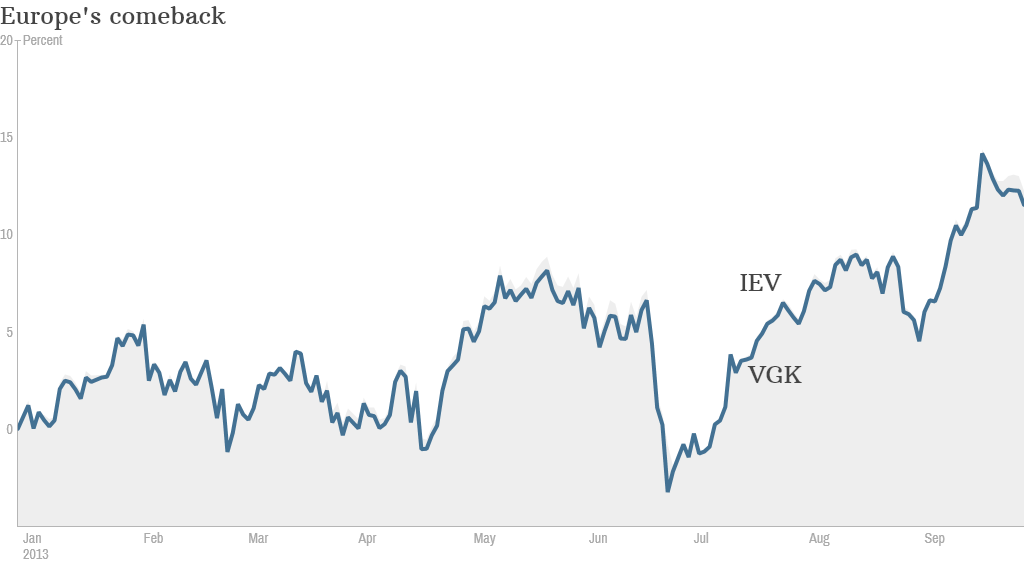
Stocks are surging in the United States this year. Japan has done even better.
But if you're looking for the next big opportunity, Europe could very well be the best place to invest right now. The long recession in Europe may finally be over. And that could lead to stronger profits from European-based companies.
So what's the safest way to try and ride a European rebound?
Investing through a mutual fund: Many funds from big money managers have a fair amount of European exposure.
Take the widely held Fidelity Worldwide Fund (FWWFX), which has 30% of its assets invested in Europe. Holdings include Swiss bank UBS (UBS), German automaker Volkswagen (VLKAY) and French food and consumer products giant Danone (DANOY).
The Dodge & Cox International Stock Fund (DODFX), one of the top 25 mutual funds by total assets, also has a 30% allocation in Europe. It owns stakes in German conglomerate Bayer (BAYRY) and the U.K. bank HSBC (HBC).
Then there are funds with an even bigger weighting in Europe, like the Vanguard International Growth Fund (VWIGX). About 55% of this fund is invested in European stocks, such as French cosmetics leader L'Oreal (LRLCF) and German athletic brand Adidas (ADDYY).
Investing via ETFs: If you want to buy a fund that focuses more directly on Europe -- and pay lower fees in the process -- you have many more options in exchange traded funds.
The largest dedicated Europe ETF by assets is the Vanguard FTSE Europe ETF (VGK), with about $13 billion under management. Top holdings include U.K.-based Royal Dutch Shell (RDSA), Swiss consumer products maker Nestle (NSRGY) and HSBC.
Best of all, the costs are super low. The VGK fund charges just 0.12% in expenses, which works out to a measly $12 a year on every $10,000 you invest.
Related: European IPOs stage a comeback
Another option is the iShares Europe ETF (IEV). It owns BP (BP) and pharmaceutical powerhouse Novartis (NVS). Both this ETF and the Vanguard fund have nearly all their assets invested in European stocks.
For those who want to take on a bit more risk, iShares also offers country-specific ETFS -- including the iShares MSCI Germany ETF (EWG) as well as the iShares MSCI Spain Capped ETF (EWP). Of course, Germany is far more stable than Spain right now, but there may be a lot more upside potential with Spain and some of the other peripheral European nations.
Investing in individual stocks: There are plenty of companies in Europe that look appealing right now.
One turnaround play worth considering is German industrial titan Siemens (SI). The company has lagged the broader market for a number of reasons, including the global downturn and its Europe exposure. But the negativity seems priced in. While Siemens is up 11% year-to-date, shares trade at just 13 times fiscal 2014 earnings estimates.
European banks, particularly in healthier nations of the euro zone, are also intriguing.
Swiss financials Credit Suisse (CS) and UBS as well as U.K. banks like Lloyd's (LYG) have delivered returns significantly better than the S&P 500 this year. Optimism regarding consumer and business lending has lifted shares, and the trend looks to continue in 2014. If you're a believer in the EU recovery, financial stocks are a great way to be at the center of an economic turnaround.
Related story: Germans back Merkel on Europe and economy
Finally, investors can also bet on a European renaissance by buying shares of big U.S. multinationals with a footprint there. One idea is automaker Ford (F), which has been increasing its market share in Europe. Another is online travel site Priceline.com (PCLN), which bought Amsterdam-based Booking.com in 2005 and has seen continued growth in European hotel bookings even during the downturn.
Of course, it's not as if Europe is devoid of risk. None of the European countries are growing rapidly. Many of the big banks still are saddled with bad debts. And there's always a chance that politicians or the European Central Bank could scuttle recovery hopes again with more boneheaded decisions.
So even though the worst may finally be over for Europe, investors need to tread cautiously.
Jeff Reeves is the editor of InvestorPlace.com and the author of "The Frugal Investor's Guide to Finding Great Stocks." Write him at editor@investorplace.com or follow him on Twitter via @JeffReevesIP. Reeves does not own a position in any of the stocks named in this story.


